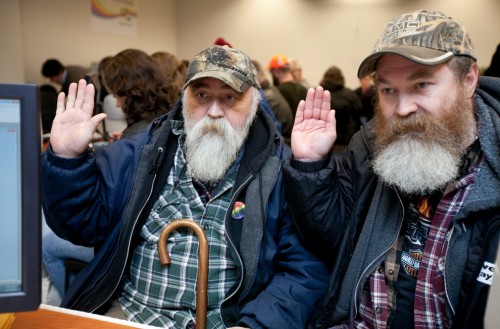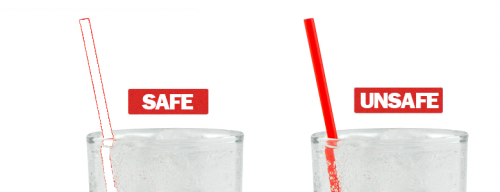Ophelia Benson called out Michael Shermer for a sexist remark he made. Now Michael Shermer responds. Well, actually, he jinks and jitters to avoid the issue, and tries a grand distraction: “Hey, look over there! It’s tribalism!”
Here’s what Shermer was caught saying in a video discussion about why women aren’t participating as much in the skeptical movement:
It’s who wants to stand up and talk about it, go on shows about it, go to conferences and speak about it, who’s intellectually active about it; you know, it’s more of a guy thing.
You know what? That is a great big hairy naked sexist remark. It’s a plain assumption that men are intrinsically better suited to leading skepticism and atheism. You can’t get much plainer than “It’s more of a guy thing.”
A good response would have been to admit that he’d made an unthinking, stupid remark and that he’d like to retract it. But that’s not what he does. Instead, he argues that he really does think the split in participation is 50/50, and points to TAM as having roughly equal numbers of men and women speaking.
Need I point out that the reason gender ratios have been improving is because people like Ophelia and Rebecca Watson and Greta Christina and Jen McCreight have been pointing out the discrimination for years, and have provided lists of excellent women and minority speakers, and conference organizers, rather than doubling down and denying the problem, have been receptive and made strong efforts to correct the bias?
Oh. So I guess it’s not a guy thing, and you were wrong, Michael. It might have been cleverer of you to just say, “I was wrong, I made a sexist remark, the evidence shows that it’s not a guy thing.” A column in which he recognized his own sexism and talked about conscious efforts to improve would have been a good and respectful step forward.
But no. Instead he goes shopping for quotes from friends to show that he was right. He asked Cara Santa Maria about this issue, and she says it’s harder to find women willing to get in front of a camera on these issues, and that women atheists are often singled out as particularly brave.
Why is that, I wonder? That’s an interesting observation. Why doesn’t Shermer follow through on that? Because it seems to me that that’s an important fact: it is harder for women to come out, to be prominent in atheist and skeptical circles. We could split the possibilities into two broad categories: it’s the fault of the women — skepticism just isn’t a gal thing — or we could lay the problem on the environment of the skeptical movement. Shermer is just going to take the lazy option of blaming the women, because the alternative would require hard work by leaders of the skeptical movement to address.
And then he brings in Harriet Hall, who also makes a sexist remark.
I think it is unreasonable to expect that equal numbers of men and women will be attracted to every sphere of human endeavor. Science has shown that real differences exist. We should level the playing field and ensure there are no preventable obstacles, then let the chips fall where they may.
So sex differences are real, and we should just pretend that we don’t see sex and gender everywhere we look? This sounds so much like the argument common among clueless white people that they don’t see color. Yeah, you do. Every one of us has preconceptions about people made on the basis of sex and race. You don’t progress by pretending that stereotypes and perception don’t shape how we judge people.
Hall should know this. We see it in science, too, where women and men have initially equivalent interest in following the field, and then women are actively discouraged from pursuing the higher ranks of their discipline. We know this; there are many studies demonstrating a sex bias in refereeing papers, in promotion and tenure, in cultural attitudes about competence. You don’t overcome those by just telling everyone there is no barrier to women and men applying for the jobs in equal numbers.
By the way, I hate the phrase “Science has shown” followed by some irrelevant fact. Science has shown that men and women have differences, true: women have vulvas and breasts, men have penises and hairier bodies. Science has not shown that women have significantly different cognitive abilities. Lady brains do not lack a skeptical module that gentlemen brains have.
And that’s really the big problem here. There is no reason anywhere to think that women have less capacity for critical thinking, or that they are intrinsically more gullible and therefore more likely to be religious, or that they are less rational and so less suited to careers in science. Shermer is talking about the skeptical movement, a pursuit dedicated to fostering greater critical thinking. Why would you argue that women have less capacity or less to gain from that? Because that’s what they’re doing, pinning the blame for less participation on the women themselves.
Oh, man, then Shermer obliviously steps right into the race issue.
Benson makes a strong case that something other than misogyny may be at work here, when she asks rhetorically if I would make the same argument about race. I would, yes, because I do not believe that the fact that the secular community does not contain the precise percentage of blacks, Latinos, Asians, and Native Americans as in the general population, means that all of us in the secular community are racists, explicitly or implicitly. A variance from perfect demographic symmetry does not necessarily correspond to racist attitudes. It just means that the world is not perfectly divided up according to population demographics, and people have different interests and causes. There is nothing inherently bigoted, racist, or misogynistic in the fact that the demographics of the secular community do not reflect those of the general population (in gender, in age and socio-economic class, or in height, weight, or any number of other variables for that matter), so short of some other evidence of bigotry, racism, and misogyny, there is no need to go in search of demons to exorcise.
Errm, yes, actually, it does mean that. Secularism itself shouldn’t be an issue for just us white folks; it’s a universal concern. The grand issues that we put front and center in our various movements — atheism, skepticism, science — really are concerns for every human being. It’s all the associated baggage that we drag in that makes us implicitly racist — we talk about White Men’s Problems all the time, we always, as white people, address the grander topics of skepticism and atheism from the narrower perspective of our particular cultural biases.
White men aren’t really all that concerned about our male children having a very high likelihood of being thrown in prison for minor drug offenses; we middle class white folk are not so concerned about economic disparities as the poor people who can’t afford to attend a conference; male organizers aren’t as aware of the problems of finding child care as women, who are saddled with most of the child-rearing obligations, are. These are implicit biases in our views. This is racism, classism, sexism.
Seriously, every one of us is racist as fuck. We can’t help it.
But denying it makes it worse. And being conscious of our biases and giving other voices a chance to speak is how we make it better.
For years, I’ve been saying that the way to make conferences and the movement as a whole less biased towards male concerns is to ask women what matters to them, and to listen and respond, rather than telling the little ladies what they need to hear. It’s the same with race. If you’re white, you’re racist, and you’ve typically got little appreciation of the experience of being black; so instead of saying, “I’m not racist, how would you like to speak on our panel about Bigfoot hunting and UFOs?” you just ask black people what’s important to them, what they’d like to talk about, what are skeptical/atheist issues of concern in their community?
Shrugging your shoulders and saying that there is nothing wrong with our values being different than those of the black community, or the Hispanic community, or those of women is an open admission that you aren’t working under the banner of Secularism, but under the banner of White Man’s Secularism. You are making an implicitly sexist/racist remark when you blandly insist that what ought to be a truly catholic movement to improve humanity is just fine if it somehow fails to engage the concerns of non-white non-male people as much as it does us.
I could go on at length about Shermer’s other complaint: that the “invectosphere” called him names. He doesn’t get to complain about that at all with respect to Ophelia, who has been under a ferocious invective assault for the last few years; that he complains about being called a “jackass” is pathetic and feeble when you compare it to the non-stop abuse Ophelia, Jen, Greta, Rebecca, and just about every woman participant in this argument gets flooded with online. And he especially doesn’t get to complain because right now his comment section is full of the very same people who obsess over these women and who spew the most disgusting sexist insults at them…and they now see him as a fellow hero fighting against feminst tribalism.



